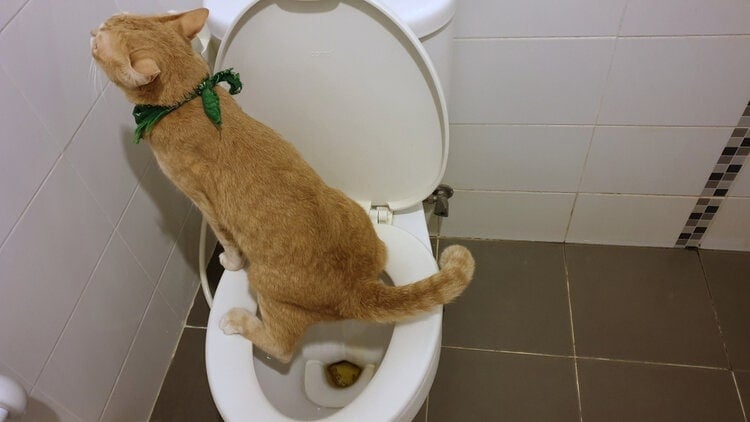Reasons You Shouldn't Flush Cat Poop Down Your Toilet - Preserve Your Pipe Health
Reasons You Shouldn't Flush Cat Poop Down Your Toilet - Preserve Your Pipe Health
Blog Article
Just about every person has got their own individual opinion involving Don’t flush cat feces down the toilet.
Intro
As pet cat proprietors, it's essential to be mindful of just how we get rid of our feline good friends' waste. While it may seem hassle-free to purge cat poop down the toilet, this technique can have destructive repercussions for both the setting and human health and wellness.
Ecological Impact
Purging pet cat poop introduces hazardous virus and parasites into the water supply, presenting a significant threat to marine ecosystems. These impurities can adversely impact marine life and compromise water quality.
Health Risks
In addition to environmental concerns, purging feline waste can likewise present health dangers to humans. Cat feces may consist of Toxoplasma gondii, a bloodsucker that can cause toxoplasmosis-- a potentially serious health problem, particularly for expecting ladies and people with damaged body immune systems.
Alternatives to Flushing
Thankfully, there are more secure and much more liable methods to get rid of pet cat poop. Take into consideration the complying with alternatives:
1. Scoop and Dispose in Trash
One of the most common technique of taking care of feline poop is to scoop it right into an eco-friendly bag and throw it in the garbage. Make sure to utilize a devoted litter inside story and take care of the waste promptly.
2. Use Biodegradable Litter
Go with naturally degradable pet cat trash made from materials such as corn or wheat. These clutters are eco-friendly and can be safely thrown away in the trash.
3. Bury in the Yard
If you have a yard, think about hiding pet cat waste in a designated location far from veggie yards and water resources. Be sure to dig deep adequate to avoid contamination of groundwater.
4. Mount a Pet Waste Disposal System
Buy an animal waste disposal system specifically designed for pet cat waste. These systems utilize enzymes to break down the waste, reducing smell and ecological influence.
Final thought
Responsible family pet possession prolongs beyond providing food and shelter-- it additionally entails appropriate waste management. By refraining from flushing pet cat poop down the bathroom and choosing alternative disposal techniques, we can lessen our ecological footprint and safeguard human health and wellness.
Why You Should Never Flush Cat Poop Down the Toilet
A rose by any other name might smell as sweet, but not all poop is created equal. Toilets, and our sewage systems, are designed for human excrement, not animal waste. It might seem like it couldn’t hurt to toss cat feces into the loo, but it’s not a good idea to flush cat poop in the toilet.
First and foremost, assuming your cat uses a litter box, any waste is going to have litter on it. And even the smallest amount of litter can wreak havoc on plumbing.
Over time, small amounts build up, filling up your septic system. Most litter sold today is clumping; it is made from a type of clay that hardens when it gets wet. Ever tried to scrape old clumps from the bottom of a litter box? You know just how cement-hard it can get!
Now imagine just a small clump of that stuck in your pipes. A simple de-clogger like Drano isn’t going to cut it. And that means it’s going to cost you big time to fix it.
Parasitic Contamination
Believe it or not, your healthy kitty may be harboring a nasty parasite. Only cats excrete Toxoplasma in their feces. Yet it rarely causes serious health issues in the cats that are infected. Most people will be fine too if infected. Only pregnant women and people with compromised immune systems are at risk. (If you’ve ever heard how women who are expecting are excused from litter cleaning duty, Toxoplasma is why.)
But other animals may have a problem if infected with the parasite. And human water treatment systems aren’t designed to handle it. As a result, the systems don’t remove the parasite before discharging wastewater into local waterways. Fish, shellfish, and other marine life — otters in particular — are susceptible to toxoplasma. If exposed, most will end up with brain damage and many will die.
Depending on the species of fish, they may end up on someone’s fish hook and, ultimately on someone’s dinner plate. If that someone has a chronic illness, they’re at risk.
Skip the Toilet Training
We know there are folks out there who like to toilet train their cats. And we give them props, it takes a lot of work. But thanks to the toxoplasma, it’s not a good idea.

I'm certainly very taken with How to Dispose of Cat Poop and Litter Without Plastic Bags and I hope you liked the entire blog posting. Appreciated our article? Please share it. Let others find it. Thanks a bunch for your time. Don't hesitate to visit our website back soon.
Book Services Report this page